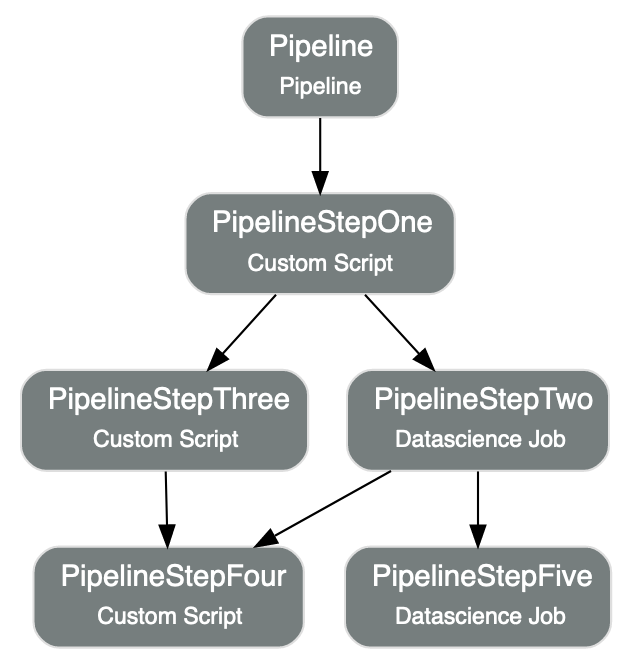Pipeline
A pipeline is a workflow of tasks, called steps. Steps can run in sequence or in parallel, creating a Directed Acyclic Graph (DAG) of the steps.
Define
In an ADS pipeline module, you can either use the Python API or YAML to define a pipeline. In addition to the configuration of the pipeline, you provide the details of Pipeline Step and the DAG of the pipeline steps (which defines the dependencies between the steps).
DAG
DAG is used to define the dependencies between the steps.
>>denotes the tasks running in sequence,A >> Bmeans that A is followed by B.()denotes the tasks running in parallel.If DAG not provided, all the steps will run in parallel.
In the example below, step_name_1 and step_name_2 will run in parallel, and step_name_3 will start after both step_name_1 and step_name_2 are complete.
(step_name_1, step_name_2) >> step_name_3
Logs
Both the log OCID and corresponding log group OCID can be specified in the Pipeline instance. If you specify only the log group OCID and no log OCID, a new Log resource is automatically created within the log group to store the logs, see ADS Logging.
There are two types of logs for pipeline runs, service log and custom log. When defining a pipeline:
to enable custom log, specify
log_idandlog_group_id.to enable service log, specify
log_group_idand setenable_service_logtoTrue.to enable both types of logs, specify
log_idandlog_group_id, and setenable_service_logtoTrue.
With the specified DAG and pre-created pipeline steps, you can define a pipeline and give it a name.
A Pipeline instance will be created.
from ads.pipeline import PipelineStep, Pipeline
pipeline_step_one = PipelineStep(
name="<pipeline_step_name>",
description="<pipeline_step_description>",
job_id="<job_id>"
)
infrastructure = CustomScriptStep(
block_storage_size=200,
shape_name="VM.Standard3.Flex",
shape_config_details={"ocpus": 4, "memory_in_gbs": 32},
)
runtime = ScriptRuntime(
script_path_uri=oci://<bucket_name>@<namespace>/<prefix>/<script.py>",
conda={"type": "service", "slug": "<slug>"}
)
pipeline_step_two = PipelineStep(
name="<pipeline_step_name>",
description="<pipeline_step_description>",
infrastructure=infrastructure,
runtime=runtime,
)
pipeline = Pipeline(
name="<pipeline_name>",
compartment_id="<compartment_id>",
project_id="<project_id>",
log_group_id="<log_group_id>",
log_id="<log_id>",
enable_service_log=True, # to stream service log in pipeline runs
step_details=[pipeline_step_one, pipeline_step_two],
dag=["pipeline_step_name_1 >> pipeline_step_name_2"],
)
from ads.pipeline import PipelineStep, Pipeline
pipeline_step_one = (
PipelineStep("<pipeline_step_name_1>")
.with_description("<pipeline_step_description>")
.with_job_id("<job_id>")
)
infrastructure = (
CustomScriptStep()
.with_block_storage_size(200)
.with_shape_name("VM.Standard3.Flex")
.with_shape_config_details(ocpus=4, memory_in_gbs=32)
)
runtime = (
ScriptRuntime()
.with_source("oci://<bucket_name>@<namespace>/<prefix>/<script.py>")
.with_service_conda("<slug>")
)
pipeline_step_two = (
PipelineStep("<pipeline_step_name_2>")
.with_description("<step_description>")
.with_infrastructure(infrastructure)
.with_runtime(runtime)
)
pipeline = (
Pipeline("<pipeline_name>")
.with_compartment_id("<compartment_id>")
.with_project_id("<project_id>")
.with_log_group_id("<log_group_id>")
.with_log_id("<log_id>")
.with_enable_service_log(True) # to stream service log in pipeline runs
.with_step_details([pipeline_step_one, pipeline_step_two])
.with_dag(["pipeline_step_name_1 >> pipeline_step_name_2"])
)
from ads.pipeline import Pipeline
yaml_string = """
kind: pipeline
spec:
compartmentId: ocid1.compartment..<unique_id>
dag:
- pipeline_step_name_1 >> pipeline_step_name_2
description: <pipeline_description>
displayName: <pipeline_display_name>
logGroupId: ocid1.loggroup.oc1..<unique_id>
logId: ocid1.log..<unique_id>
enableServiceLog: True
maximumRuntimeInMinutes: 20
projectId: ocid1.datascienceproject..<unique_id>
stepDetails:
- kind: dataScienceJob
spec:
description: <pipeline_step_description>
jobId: ocid1.datasciencejob..<unique_id>
name: pipeline_step_name_1
- kind: customScript
spec:
description: <pipeline_step_description>
infrastructure:
kind: infrastructure
spec:
blockStorageSize: 200
shapeConfigDetails:
memoryInGBs: 32
ocpus: 4
shapeName: VM.Standard3.Flex
name: pipeline_step_name_2
runtime:
kind: runtime
spec:
conda:
slug: <slug>
type: service
scriptPathURI: oci://<bucket_name>@<namespace>/<prefix>/<script.py>
type: script
type: pipeline
"""
pipeline = Pipeline.from_yaml(yaml_string)
Create
You can call the create() method of the Pipeline instance to create a pipeline.
# Create a pipeline
pipeline.create()
Run
You can call the run() method of the Pipeline instance to launch a new Pipeline Run.
It returns a PipelineRun instance.
The run() method gives you the option to override the configurations in a pipeline run. It takes the following optional parameters:
display_name: str, optional. Defaults toNone. The display name of the run.
project_id: str, optional. Defaults toNone. The project id to override the one defined previously.
compartment_id: str, optional. Defaults toNone. The compartment id to override the one defined previously.
configuration_override_details: dict, optional. Defaults toNone. The configuration details dictionary to override the one defined previously. Theconfiguration_override_detailscontains the following keys:
type: str, onlyDEFAULTis allowed;environment_variables: dict, the environment variables;command_line_arguments: str, the command line arguments;maximum_runtime_in_minutes: int, the maximum runtime allowed in minutes. -log_configuration_override_details: dict, optional. Defaults toNone. The log configuration details dictionary to override the one defined previously. -step_override_details: list[PipelineStepOverrideDetails], optional. Defaults toNone. The step details list to override the one defined previously. -free_form_tags: dict(str, str), optional. Defaults toNone. The free from tags dictionary to override the one defined previously. -defined_tags: dict(str, dict(str, object)), optional. Defaults toNone. The defined tags dictionary to override the one defined previously. -system_tags: dict(str, dict(str, object)), optional. Defaults toNone. The system tags dictionary to override the one defined previously.
# Run a pipeline, a pipeline run will be created and started
pipeline_run = pipeline.run()
Load
Use the from_ocid() method from the Pipeline class to load an existing pipeline with its OCID provided. It returns a Pipeline instance.
from ads.pipeline import Pipeline
pipeline = Pipeline.from_ocid("ocid1.datasciencepipeline..<unique_id>")
Visualize
Use the show() method on the Pipeline instance to visualize the pipeline in a graph.
The show() method takes the following optional parameter:
rankdir: (str, optional). Defaults toTB. The allowed values areTBorLR. This parameter is applicable only forgraphmode and it renders the direction of the graph as either top to bottom (TB) or left to right (LR).
pipeline.show()
Below is an example of the output.

Delete
Use the delete() method on the Pipeline instance to delete a pipeline. It takes the following optional parameters:
delete_related_pipeline_runs: (bool, optional). Specify whether to delete related PipelineRuns or not. Defaults toTrue.
delete_related_job_runs: (bool, optional). Specify whether to delete related JobRuns or not. Defaults toTrue.
max_wait_seconds: (int, optional). The maximum time to wait, in seconds. Defaults to1800.
A pipeline can only be deleted when its associated pipeline runs are all deleted,
or alternatively, set the parameter delete_related_pipeline_runs to delete all associated runs in the same operation.
Delete fails if a PipelineRun is in progress.
pipeline.delete()